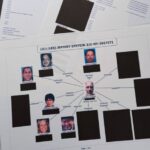
If having a great report card on gun control prevented gun tragedies, Highland Park, Illinois, would not be trending in America this week. But it is. And voices are demanding that while the political back-and-forth over gun control plays out in Washington, someone deal with the real problems.
As noted by Breitbart, Highland Park has its own “assault weapons” ban and is in a state that gets an A- from the Giffords Law Center for the severity of its anti-gun laws. Everytown for Gun Safety says Illinois has the sixth most stringent anti-gun laws in the nation.
The state has a red flag law, a waiting period to buy a gun and a long train of conditions imposed on gun purchasers.
And yet, seven people are dead, dozens more are wounded and hundreds scarred.
Some are approaching the problem much as former President Donald Trump did during his first presidential campaign.
“You’re going to have problems no matter how good, no matter what kind of checks you do, you know, what kind of laws,” he said in 2015 in response to a shooting, according to Politico. “Now, with that, I think mental health, we have to do better. We have to do a much better job with mental health.”
On Tuesday, Warren Fried of Highland Park used very different words but had the same focus, according to Fox News.
Fried said he has been dealing with how to tell his children, who were at the parade, about the shooting.
Will those calling for a ban on guns even consider any other course of action?
Yes: 9% (2 Votes)
No: 91% (20 Votes)
“We understand some of the social judgments and the frustrations,” he said. “We don’t care about politics. We don’t have concern about the gun debate. We want to know why someone with a neurological … who wasn’t right, who lived in our community, didn’t get the support and resources that my children are getting right now, so they can be as best as possible.”
He said the focus should not be on the gun, but on what went wrong that the shooter was on the roof in the first place.
“What made him turn so bad, why did he get so angry and so frustrated?” Fried questioned. “What could we have done to help him better? Why does someone do this, and what makes them feel so compelled to get so angry and so frustrated?”
In his column in the New York Post, columnist Bob McManus suggested the problem runs deeper than guns.
He noted that even if gun laws were passed to the delight of the anti-gun lobby “a nation that can’t keep out cocaine, heroin, fentanyl and illegal immigrants probably won’t succeed in keeping out guns, either …”
McManus said the shooting is a reminder that one connection among the gunmen in high-profile mass shootings is mental instability.
He said attention must be focused upon those with “violently expressed mental illness and its corollary, the clearly disturbed and deteriorating individual who may not yet have hurt someone, but who unmistakably is headed in that direction.”
“Full details are lacking on the Highland shooter, but he seems to be mad, and there’s no doubt that both the Uvalde and Buffalo killers were too. Dramatically so,” he said, noting that they are not alone.
“And then there are the muttering subway pushers, random slashers and incoherent sidewalk campers who pose such a threat to big-city dwellers everywhere,” he wrote.
He noted that little can be done due to court rulings that “make it very difficult to intervene, even where the need is obvious, until the rifle fire begins or there’s another dead body on the tracks.”
McManus called the overall issue “America’s growing refusal to protect its citizens from violence. In its cities, that’s what the bail-reform/defund-the-police movement is all about — shielding criminals from the consequences of their actions.”
He noted that “some problems are so complex that there may be no practical solutions, ever. But when a common thread runs through two matters so intensely urgent, shouldn’t it at least be addressed?
“Certainly all Americans have rights — but they should include the right to be protected from the armed and dangerous: Urban gangbangers and psychotic loners with rifles both. Again, there are no simple answers. But developing more respect for the power of preventive action would be a long step in the right direction.”







